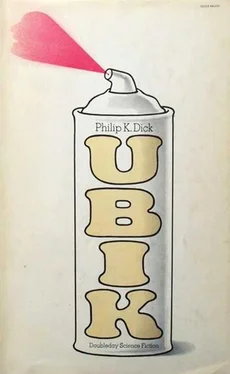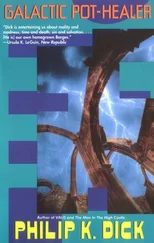“Turn right,” Tippy Jackson said.
Pat said, “You’ll see a brick building with a neon sign going up and down. The Meremont Hotel, it’s called. A terrible place. One bathroom for every two rooms, and a tub instead of a shower. And the food. Incredible. And the only drink they sell is something called Nehi.”
“I liked the food,” Don Denny said. “Genuine cowmeat, rather than protein synthetics. Authentic salmon—”
“Is your money good?” Joe asked. And then he heard a high-pitched whine, echoing up and down the street behind him. “What’s that mean?” he asked Denny.
“I don’t know,” Denny said nervously.
Sammy Mundo said, “It’s a police siren. You didn’t give a signal before you turned.”
“How could I?” Joe said. “There’s no lever on the steering column.”
“You should have made a hand signal,” Sammy said. The siren had become very close now; Joe, turning his head, saw a motorcycle pulling up abreast with him. He slowed the car, uncertain as to what he should do. “Stop at the curb,” Sammy advised him.
Joe stopped the car at the curb.
Stepping from his motorcycle, the cop strolled up to Joe, a young, rat-faced man with hard, large eyes; he studied Joe and then said, “Let me see your license, mister.”
“I don’t have one,” Joe said. “Make out the ticket and let us go.” He could see the hotel now. To Don Denny he said, “You better get over there, you and everyone else.” The Willys-Knight continued on toward it. Don Denny, Pat, Sammy Mundo and Tippy Jackson abandoned the car; they trotted after the Willys-Knight, which had begun to slow to a stop across from the hotel, leaving Joe to face the cop alone.
The cop said to Joe, “Do you have any identification?”
Joe handed him his wallet. With a purple indelible pencil the cop wrote out a ticket, tore it from his pad and passed it to Joe. “Failure to signal, No operator’s license. The citation tells where and when to appear.” The cop slapped his ticket book shut, handed Joe his wallet, then sauntered back to his motorcycle. He revved up his motor and then zoomed out into traffic without looking back.
For some obscure reason Joe glanced over the citation before putting it away in his pocket. And read it once again—slowly. In purple indelible pencil the familiar scrawled hand-writing said:
You are in much greater danger than I thought. What Pat Conley said is
There the message ceased. In the middle of a sentence. He wondered how it would have continued. Was there anything more on the citation? He turned it over, found nothing, returned again to the front side. No further handwriting, but, in squirrel agate type at the bottom of the slip of paper, the following inscription:
Try Archer’s Drugstore for reliable household remedies and medicinal preparations of tried and tested value. Economically priced.
Not much to go on, Joe reflected. But still—not what should have appeared at the bottom of a Des Moines traffic citation; it was, clearly, another manifestation, as was the purple handwriting above it.
Getting out of the Pierce-Arrow, he entered the nearest store, a magazine, candy and tobacco-supply shop. “May I use your phone book?” he asked the broad-beamed, middle-aged proprietor.
“In the rear,” the proprietor said amiably, with a jerk of his heavy thumb.
Joe found the phone book and, in the dim recesses of the dark little store, looked up Archer’s Drugstore. He could not find it listed.
Closing the phone book, he approached the proprietor, who at the moment was engaged in selling a roll of Necco wafers to a boy. “Do you know where I can find Archer’s Drugstore?” Joe asked him.
“Nowhere,” the proprietor said. “At least, not any more.”
“Why not?”
“It’s been closed for years.”
Joe said, “Tell me where it was. Anyhow. Draw me a map.”
“You don’t need a map; I can tell you where it was.” The big man leaned forward, pointing out the door of his shop. “You see that barber pole there? Go over there and then look north. That’s north.” He indicated the direction. “You’ll see an old building with gables. Yellow in color. There’s a couple of apartments over it still being used, but the store premises downstairs, they’re abandoned. You’ll be able to make out the sign, though: Archer’s Drugs. So you’ll know when you’ve found it. What happened is that Ed Archer came down with throat cancer and—”
“Thanks,” Joe said, and started out of the store, back into the pale midafternoon sunlight; he walked rapidly across the street to the barber pole, and, from that position, looked due north.
He could see the tall, peeling yellow building at the periphery of his range of vision. But something about it struck him as strange. A shimmer, an unsteadiness, as if the building faded forward into stability and then retreated into insubstantial uncertainty. An oscillation, each phase lasting a few seconds and then blurring off into its opposite, a fairly regular variability as if an organic pulsation underlay the structure. As if, he thought, it’s alive.
Maybe, he thought, I’ve come to the end. He began to walk toward the abandoned drugstore, not taking his eyes from it; he watched it pulse, he watched it change between its two states, and then, as he got closer and closer to it, he discerned the nature of its alternate conditions. At the amplitude of greater stability it became a retail home-art outlet of his own time period, homeostatic in operation, a self-service enterprise selling ten-thousand commodities for the modern conapt; he had patronized such highly functional computer-controlled pseudo merchants throughout his adult life.
And, at the amplitude of insubstantiality, it resolved itself into a tiny, anachronistic drugstore with rococo ornamentation. In its meager window displays he saw hernia belts, rows of corrective eyeglasses, a mortar and pestle, jars of assorted tablets, a hand-printed sign reading LEECHES, huge glass-stoppered bottles that contained a Pandora’s heritage of patent medicines and placebos… and, painted on a fiat wood board running across the top of the windows, the words ARCHER’S DRUGSTORE. No sign whatever of an empty, abandoned, closed-up store; its 1939 stage had somehow been excluded. He thought, So in entering it I either revert further or I find myself back roughly in my own time. And—it’s the further reversion, the pre-1939 phase, that I evidently need.
Presently he stood before it, experiencing physically the tidal tug of the amplitudes; he felt himself drawn back, then ahead, then back again. Pedestrians clumped by, taking no notice; obviously, none of them saw what he saw: They perceived neither Archer’s Drugstore nor the 1992 home-art outlet. That mystified him most of all.
As the structure swung directly into its ancient phase he stepped forward, crossed the threshold. And entered Archer’s Drugstore.
To the right a long marble-topped counter. Boxes on the shelves, dingy in color; the whole store had a black quality to it, not merely in regard to the absence of light but rather a protective coloration, as if it had been constructed to blend, to merge with shadows, to be at all times opaque. It had a heavy, dense quality; it pulled him down, weighing on him like something installed permanently on his back. And it had ceased to oscillate. At least for him, now that he had entered it. He wondered if he had made the right choice; now, too late, he considered the alternative, what it might have meant. A return—possibly—to his own time. Out of this devolved world of constantly declining time-binding capacity—out, perhaps, forever. Well, he thought, so it goes. He wandered about the drugstore, observing the brass and the wood, evidently walnut… He came at last to the prescription window at the rear.
Читать дальше








